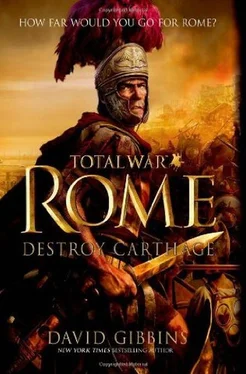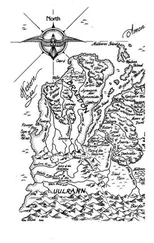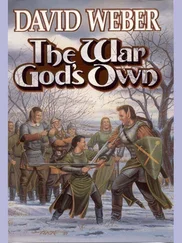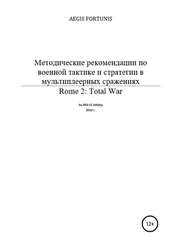David Gibbins - Total War Rome - Destroy Carthage
Здесь есть возможность читать онлайн «David Gibbins - Total War Rome - Destroy Carthage» весь текст электронной книги совершенно бесплатно (целиком полную версию без сокращений). В некоторых случаях можно слушать аудио, скачать через торрент в формате fb2 и присутствует краткое содержание. Год выпуска: 0101, Издательство: Thomas Dunne Books, Жанр: Исторические приключения, на английском языке. Описание произведения, (предисловие) а так же отзывы посетителей доступны на портале библиотеки ЛибКат.
- Название:Total War Rome: Destroy Carthage
- Автор:
- Издательство:Thomas Dunne Books
- Жанр:
- Год:0101
- ISBN:нет данных
- Рейтинг книги:5 / 5. Голосов: 1
-
Избранное:Добавить в избранное
- Отзывы:
-
Ваша оценка:
- 100
- 1
- 2
- 3
- 4
- 5
Total War Rome: Destroy Carthage: краткое содержание, описание и аннотация
Предлагаем к чтению аннотацию, описание, краткое содержание или предисловие (зависит от того, что написал сам автор книги «Total War Rome: Destroy Carthage»). Если вы не нашли необходимую информацию о книге — напишите в комментариях, мы постараемся отыскать её.
Total War Rome: Destroy Carthage — читать онлайн бесплатно полную книгу (весь текст) целиком
Ниже представлен текст книги, разбитый по страницам. Система сохранения места последней прочитанной страницы, позволяет с удобством читать онлайн бесплатно книгу «Total War Rome: Destroy Carthage», без необходимости каждый раз заново искать на чём Вы остановились. Поставьте закладку, и сможете в любой момент перейти на страницу, на которой закончили чтение.
Интервал:
Закладка:
‘Keep your word. Only then will cities surrender to you.’
‘Good. Scipio?’
‘In a new province, define your borders,’ Scipio said. ‘Otherwise war is inevitable.’
Polybius nodded. ‘When Carthage was allowed to keep some of her territory in Africa after the Battle of Zama, the borders were ill defined. It was a recipe for war. Lucius?’
‘Exploit superstition. If your army feels they have divine guidance, then encourage them to believe it.’
‘Brutus?’
‘Punish savagely those you have conquered who are not yet obedient, to inspire fear and terror.’
‘Zeus above,’ Polybius murmured. ‘That sounds like something from Sparta.’
‘My father taught it to me,’ Brutus said, his massive forearms folded over his chest. ‘He said there would be more to the academy than swordplay, and that I should be ready with some ideas.’
‘Maybe you’d better stick to your strengths,’ Polybius muttered. ‘Fabius?’
Fabius was discomfited. ‘I’m only here as Scipio’s servant, Polybius. I will never lead an army.’
‘You may not lead an army, but men like you will be the backbone of the army. What do you say?’
Fabius thought for a moment. ‘Cowardice must not go unpunished.’
Polybius nodded slowly, and then smiled. ‘All right. That’s enough gravitas for today. Hippolyta’s offered to teach you how to use a Scythian bow. See you all in the arena in half an hour.’
Scipio said, standing up and stretching, ‘Twenty minutes’ rest before the centurion arrives. Drink some water and eat some fruit. You’ll need it if we’re going out on to the arena.’
Polybius pointed at the diorama. ‘If Julia had been here, she could have told us more. Her father Sextus Julius Caesar was at Zama as a junior tribune. She knows the battle like the back of her hand.’
Scipio looked around, suddenly missing her. ‘Has anyone seen Julia?’
‘She’s not coming today,’ one of the others said. ‘She’s accompanying her mother to the Temple of the Vestal Virgins for some kind of ceremony.’
‘Let’s just hope the Virgins don’t take her,’ someone else sniggered. ‘That would deprive us of some fun. That is, if Scipio will let us have it.’
‘Shut it, Lucius,’ Polybius said tiredly. ‘Or Scipio will have his friend Brutus here hack off your manhood.’
Fabius saw Scipio clasp the amulet around his neck that he knew Julia had given him, an ancient Etruscan device of an eagle passed down through her gens, and then look down in annoyance. He knew that Scipio hated himself for showing his feelings for Julia. He saw Metellus staring at Scipio, questioningly, and he suddenly remembered. Metellus had been away in Macedonia for almost two years, so would have no idea of Scipio’s affection for Julia. Scipio shook his head dismissively, as if Julia was of no consequence to him, and then stood square and folded his arms over his chest, nodding at the diorama. ‘I’m expecting all of you to memorize the entire order of battle, down to the last maniple and rag-tag auxiliary unit. You can spend the next twenty minutes doing that instead. When the centurion returns, he’ll test you on it. Get one thing wrong, and you know what will happen. I can assure you that the pain from his vine staff will be greater than anything Brutus might be likely to mete out. Now get on with it.’
In the silence that followed, Fabius scanned the room. Most of them were sixteen or seventeen years old, on the cusp of manhood, several a year or two younger. When the trumpets of war sounded, when the centurion deemed them ready, they would be appointed as military tribunes in the Roman army, the first rung in the ladder that might lead those who survived to command legions, to lead armies, even to the consulship, the highest office in the Republic. They were scions of the greatest patrician families of Rome: the gens Julii, the gens Junia, the gens Claudia, the gens Valeria, and Scipio’s adopted branch of the gens Cornelia, the Scipiones. In their sprawling houses on the Palatine were shrines filled with wax busts of ancestors who had gained glory in war, some dating back to the time of Romulus and the foundation of the city almost six hundred years before, and many from the succession of devastating wars that Rome had fought in recent centuries: against the Latin tribes and the Etruscans near to Rome, against the Celts to the north, against the Greek colonies of Italy and Sicily, and above all in the titanic struggle against Carthage, a conflict that had begun almost a hundred years before and still haunted them all, a war that should have ended with the Battle of Zama if the senators had allowed the act of destruction that would have secured Rome’s dominance in the west Mediterranean and allowed her to focus her whole might on Greece and the riches of the east.
And they were not all men. Fabius let his eyes linger on a dark corner of the room and saw her, taller than any of them except Polybius, watching everything intently, her eyes briefly catching his. Her red hair was woven into a long tail behind her head, and she had dark kohl rings around her eyes. In the arena she took off her gold neck torque and bracelets and fought without armour, wearing only a white tiger skin wrapped tightly around her midriff and chest. They had been astonished at the tattoo on her back, an eagle with wings outstretched from shoulder blade to shoulder blade. They knew her by her Greek name, Hippolyta, meaning ‘Wild Mare’, but the centurion had told them before she arrived that her name in her own language was Oiropata, meaning ‘Killer of Men’. They had scoffed at it, but everyone had gone silent when she had walked through the door and they had seen her physique. She was a Scythian princess, the daughter of a client king from the steppe lands to the north of the Black Sea, and the centurion had explained that there were more of them, expert female horse riders and archers, and that one day she might lead an ala of Scythian cavalry alongside a Roman army. Polybius spoke her language and had questioned her at length about Scythian history, and had helped to improve her Latin. The others kept their distance, fearful of being singled out by the centurion to fight her in unarmed combat and endure the humiliation of almost certain defeat.
And then there was Julia. She was from the Caesares branch of the gens Julia, the daughter of Sextus Julius Caesar who had fought as a tribune at Zama. She was no warrior princess like Hippolyta, but she had a shrewd tactical mind and would have swept the floor that day with her knowledge of the battle that had made her father’s name. Fabius had seen how Julia had made Scipio’s pulse quicken, how when she was watching him in the arena fighting he was possessed by a force that seemed to come from the gods. Fabius himself had felt a stab of pain when he first saw Julia’s affection for Scipio, casting his mind back to that night when she had come to him in the servant’s quarters, but it had quickly passed. He remembered the look that Metellus had given Scipio. Fabius knew that Scipio had been dreading the arrival of Metellus, and welcoming it at the same time: dreading it because it might break the bond between him and Julia, welcoming it because it might help to suppress the feelings he had for her which could threaten his career. Metellus had been betrothed to Julia since she had been a small child, and he was Scipio’s second cousin on his mother’s side.
Scipio himself was enmeshed in social obligations; he was the son of Aemilius Paullus of the gens Aemilii but also the adoptive son of Publius Cornelius Scipio, eldest son of the great Scipio Africanus, who was also Scipio’s great-uncle on his mother’s side. He had been given up for adoption only because he had two elder brothers, and because the third son was never accorded the same privileges in his career; without adoption he would never have been poised to become a military tribune as he was now. It had been a huge honour to be adopted by the son of Scipio Africanus, but it had come with the burden of his own betrothal to Claudia Pulchra of the gens Claudia, a girl he profoundly disliked who hardly lived up to her cognomen, yet whom he knew was counting down every day with bated breath until his eighteenth birthday and the formal beginning of the marriage rites. Every time that he and Fabius had to go near her house on the Esquiline Hill they made elaborate detours to avoid being spotted from the bower where she sat with her slave girls overlooking the city, looking forward to the kind of future doing the social rounds and scheming with the matrons of the other gentes that Scipio dreaded far more than the worst enemy on the battlefield.
Читать дальшеИнтервал:
Закладка:
Похожие книги на «Total War Rome: Destroy Carthage»
Представляем Вашему вниманию похожие книги на «Total War Rome: Destroy Carthage» списком для выбора. Мы отобрали схожую по названию и смыслу литературу в надежде предоставить читателям больше вариантов отыскать новые, интересные, ещё непрочитанные произведения.
Обсуждение, отзывы о книге «Total War Rome: Destroy Carthage» и просто собственные мнения читателей. Оставьте ваши комментарии, напишите, что Вы думаете о произведении, его смысле или главных героях. Укажите что конкретно понравилось, а что нет, и почему Вы так считаете.












